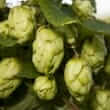Background
- The hop is a member of the Cannabaceae family, traditionally used for relaxation, sedation, and to treat insomnia. A number of methodologically weak human trials have investigated hops in combination with valerian (Valeriana officinalis) for the treatment of sleep disturbances, and several animal studies have examined the sedative properties of hops alone. However, the results of these studies are equivocal, and there is currently insufficient evidence to recommend hops alone or in combination for any medical condition.
- Hops are also sometimes found in combination products with passionflower (Passiflora incarnata), skullcap (potentially damaging to the liver), or with a high percentage of alcohol (up to 70% grain alcohol), confounding the association between the herb and possible sedative or hypnotic effects.
- Hops contain phytoestrogens that may possess estrogen receptor agonist or antagonist properties with unclear effects on hormone-sensitive conditions, such as breast, uterine, cervical, or prostate cancer or endometriosis.
References
Natural Standard developed the above evidence-based information based on a thorough systematic review of the available scientific articles. For comprehensive information about alternative and complementary therapies on the professional level, go to . Selected references are listed below.
- Chadwick LR, Nikolic D, Burdette JE, et al. Estrogens and congeners from spent hops (Humulus lupulus). J Nat Prod 2004 Dec;67(12):2024-32.
View Abstract - Estrada JL, Gozalo F, Cecchini C, et al. Contact urticaria from hops (Humulus lupulus) in a patient with previous urticaria-angioedema from peanut, chestnut and banana. Contact Dermatitis 2002;46(2):127.
View Abstract - Gerhauser C, Alt A, Heiss E, et al. Cancer chemopreventive activity of Xanthohumol, a natural product derived from hop. Mo vl Cancer Ther 2002;1(11):959-969.
View Abstract - Henderson MC, Miranda CL, Stevens JF, et al. In vitro inhibition of human P450 enzymes by prenylated flavonoids from hops, Humulus lupulus. Xenobiotica 2000;30(3):235-251.
View Abstract - Heyerick A, Vervarcke S, Depypere H, et al. A first prospective, randomized, double-blind, placebo-controlled study on the use of a standardized hop extract to alleviate menopausal discomforts. Maturitas 2006;54(2):164-75.
View Abstract - Lukaczer D, Darland G, Tripp M, et al. A pilot trial evaluating Meta050, a proprietary combination of reduced iso-alpha acids, rosemary extract and oleanolic acid in patients with arthritis and fibromyalgia. Phytother Res 2005;19(10):864-9.
View Abstract - Milligan S, Kalita J, Pocock V, et al. Oestrogenic activity of the hop phyto-oestrogen, 8-prenylnaringenin. Reproduction 2002;123(2):235-242.
View Abstract - Morali G, Polatti F, Metelitsa EN, et al. Open, non-controlled clinical studies to assess the efficacy and safety of a medical device in form of gel topically and intravaginally used in postmenopausal women with genital atrophy. Arzneimittelforschung 2006;56(3):230-8.
View Abstract - Morin CM, Koetter U, Bastien C, et al. Valerian-hops combination and diphenhydramine for treating insomnia: a randomized placebo-controlled clinical trial. Sleep 2005 Nov 1;28(11):1465-71.
View Abstract - Possemiers S, Bolca S, Grootaert C, et al. The prenylflavonoid isoxanthohumol from hops (Humulus lupulus L.) is activated into the potent phytoestrogen 8-prenylnaringenin in vitro and in the human intestine. J Nutr 2006 Jul;136(7):1862-7.
View Abstract - Schellenberg R, Sauer S, Abourashed EA, et al. The fixed combination of valerian and hops (Ze91019) acts via a central adenosine mechanism. Planta Med 2004 Jul;70(7):594-7.
View Abstract - Spiewak R, Dutkiewicz J. Occupational airborne and hand dermatitis to hop (Humulus lupulus) with non-occupational relapses. Ann Agric Environ Med 2002;9(2):249-252.
View Abstract - Stevens JF, Page JE. Xanthohumol and related prenylflavonoids from hops and beer: to your good health! Phytochemistry 2004 May;65(10):1317-30.
View Abstract - Sun J. Morning/evening menopausal formula relieves menopausal symptoms: a pilot study. J Altern Complement Med 2003 Jun;9(3):403-9.
View Abstract - Yajima H, Ikeshima E, Shiraki M, et al. Isohumulones, bitter acids derived from hops, activate both peroxisome proliferator-activated receptor alpha and gamma and reduce insulin resistance. J Biol Chem 2004 Aug 6;279(32):33456-62.
View Abstract







